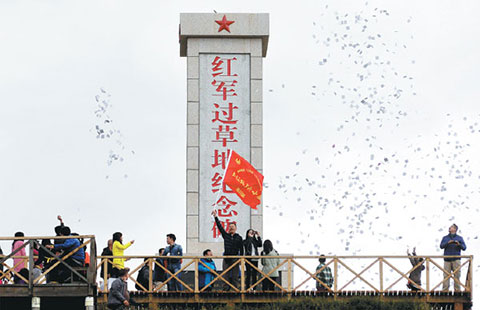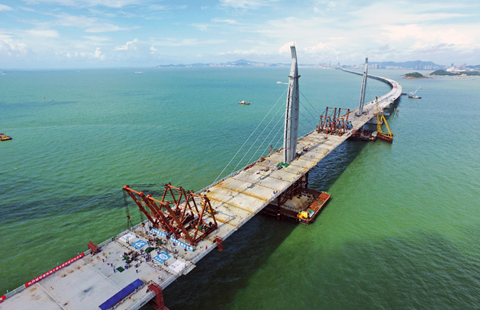Chengdu goes global with railway network
By Peng Chao (China Daily) Updated: 2016-09-24 07:44
Chengdu, a megacity in western China, is transforming into an international transportation hub through the expansion of its railway networks.
The city launched a cargo train express service to Istanbul, the capital of Turkey, on Sept 6.
Loaded with 41 containers of mechanical products and general merchandise primarily from Shanghai and Shenzhen, the express train will travel to stations in Aktau, Baku, Poti and Istanbul, according to Chengdu Port and Logistics Office.
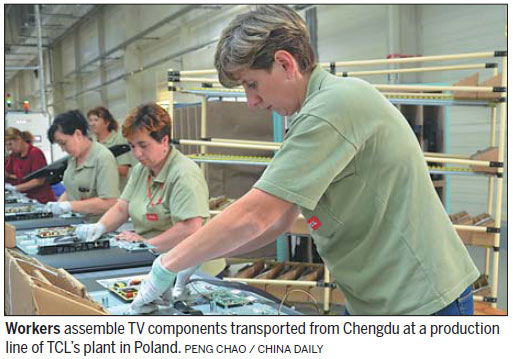
The Chengdu-Istanbul route is one of the three planned cargo rail lines between Chengdu and Europe under the Chengdu-Europe Plus strategy, focusing on the South European market.
Chengdu launched the Chengdu-Europe express rail in April 2013 in line with the Belt and Road Initiative proposed by President Xi Jinping.
The route starts from Chengdu and ends in Lodz, Poland, stretching 9,826 kilometers.
The city then launched the Chengdu-Europe Plus strategy in 2015, which refers to increased rail connections with both domestic and European cities, making Chengdu a central hub for logistics between Europe and pan-Asia.
The Chengdu-Europe express rail has expanded to domestic cities including Xiamen, Shenzhen, Kunming and Ningbo.
It is also expected to cover the Pearl River Delta, Yangtze River Delta and Bohai Economic Rim, as well as some East and Southeast Asian countries and regions.
In Europe, the Chengdu-Lodz route has expanded to Kutno, Poland, and Nuremberg, Germany.
The city is also planning to open its third cargo rail line to Europe by the end of this year, connecting the city directly to Russia.
The Chengdu-Lodz route is one of the fastest and most frequently used cargo express service lines between China and Europe. A one-way trip takes roughly 10.5 days.
The trains from Chengdu to Europe mainly carry cargo including electronic devices, car parts, heavy machinery and general merchandise, while the trains coming back from Europe to Chengdu mainly carry food, drinks and furniture.
The express rail has run 329 journeys and delivered 26,976 standard containers with 40,700 tons of freight valued at more than $1 billion by the end of July this year. It is expected to run 400 journeys this year and 1,000 journeys next year, according to Chengdu Port and Logistics Office.
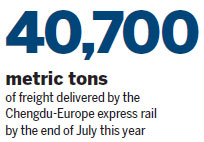
Many companies in and around Chengdu, and even those in coastal cities and provinces such as Shanghai, Fujian and Guangdong, also chose the express rail to transport their goods. Since January, 99 percent of the components used for TVs sold in Europe have been transported through the Chengdu-Europe express rail, according to Tomasz Olender, deputy general manager of TCL's plant in Poland.
Olender said TCL used to transport the components to Europe by sea, which takes about six weeks, while the Chengdu CR Express cuts the transportation time to less than two weeks. "This makes us more competitive toward customers, because all of our customers in Europe want to have the product very fast," he said, adding that it is convenient to deliver the products from the Poland factory to any destination in Europe in four days.
Liang Tiemin, vice-president of TCL Multimedia, said the company is scheduled to add 800,000 TV sets of production capacity to its factory in Chengdu, by the end of next year.
"We will make Chengdu our major manufacturing base for TVs sold in Europe," he said. Gree Electric Appliances Inc and the Chengdu city government signed a strategic cooperation framework agreement on May 31.
"We feel very positive about Chengdu's strategic position and its market potential. We will establish long-term strategic cooperation with Chengdu and settle more competitive and prospect projects in Chengdu," said Dong Mingzhu, CEO of Gree.
She said Gree will take active involvement in the Chengdu-Europe Plus strategy and develop export processing businesses in Chengdu geared toward countries and regions along the Belt and Road. Chengdu is completely upgrading its domestic railway network.
By 2020, it will be possible to travel between Chengdu and Chongqing and other nearby cities within an hour; to major cities such as Xi'an, Kunming, Guiyang and Wuhan within four hours; and to the Yangtze River Delta, Pearl River Delta and the Bohai Rim within eight hours.
According to the city's latest strategic plan, Chengdu will be actively involved in the Belt and Road Initiative, and build an international logistics system that features "two ports and three networks", which refers to the international railway port, international airport, land logistics network, airlogistics network and air passenger network. Local officials believe that theefficient and fully functionallogistics system will boost Chengdu to transfer from a regional hub city to a nationalcentralcity.
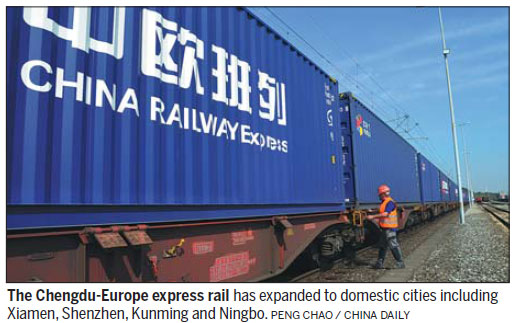
(China Daily 09/24/2016 page18)
- China shuts schools and recalls fishing boats as typhoon hits
- Mainland tourists shunning Taiwan
- Beijing rebuffs US charges for Chinese firm
- Website broadcasting Chinese courts goes live
- President Xi expects strong, modern rocket force
- Four former senior officials charged with bribery in action against corruption
- Survey indicates a greater need for sexual education
- Tiangong-2 space lab enters preset orbit for docking with manned spacecraft
- Air force in Pacific drill to test far-offshore strength
- Shanghai easing way for expat talent


